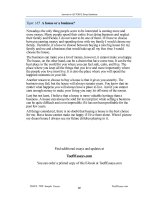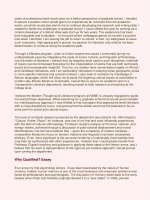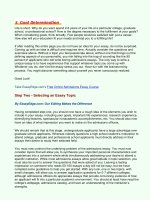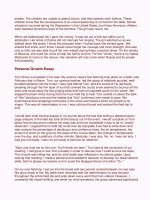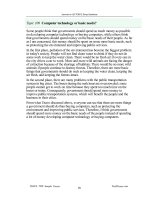Answers to all toefl essay question part 50
Bạn đang xem bản rút gọn của tài liệu. Xem và tải ngay bản đầy đủ của tài liệu tại đây (45.49 KB, 10 trang )
years of professional work would give me a better perspective of graduate school. I decided
to secure a position which would grant me experiences far removed from the academic
world, yet which would also permit me to continue developing the research and writing skills I
needed to tackle the challenges of graduate school. I have fulfilled this goal by working as a
content developer at a Silicon Alley web start-up for two years. The experience has been
both enjoyable and invaluable -- to the point where colleagues glance at me with a puzzled
look when I tell them I am leaving the job to return to school. In fact, my willingness to leave
such a dynamic, high-paying job to pursue my passion for literature only reflects my keen
determination to continue along the academic path.
Through a Masters program, I plan to further explore the issues I confronted during my
undergraduate years by integrating the study of social, cultural, and linguistic anthropology
into the realm of literature. I believe that, by adopting tools used in such disciplines, methods
of inquiry can be formulated that allow for the interpretation of works that are both technically
sound and sociologically insightful. Thus far, my studies have concentrated largely on African
and Caribbean literatures, and I am particularly interested in studying these geographic areas
in more specific historical and cultural contexts. I also seek to increase my knowledge of
African languages, which will allow me to study the lingering cultural impact of colonialism in
modern-day African literature. Eventually, I would like to secure an academic post in a
Comparative Literature department, devoting myself to both research and teaching at the
college level.
I believe the Modern Thought and Literature program at NAME is uniquely equipped to guide
me toward these objectives. While searching for a graduate school that would accommodate
my interdisciplinary approach, I was thrilled to find a program that approaches world literature
with a cross-disciplinary focus, recognizing that the written word has the potential to be an
entry point for social and cultural inquiry.
The level of scholarly research produced by the department also attracts me. Akhil Gupta's
"Culture, Power, Place", for instance, was one of my first and most influential experiences
with the field of cultural anthropology. Professor Gupta's analysis of the local, national, and
foreign realms, achieved through a discussion of post-colonial displacement and mixed
identifications, has led me to believe that -- given the complexity of modern societies --
comparative literature's focus on borders (national and linguistic) has been excessively
arbitrary. Even more significant is the accurate rendering of individually-lived realities that
may then be synthesized with other experiences. I believe that I could greatly benefit from
Professor Gupta's teaching and guidance in applying these ideas to the literary arena, and I
believe that his work is representative of the rigorous yet creative approach I would pursue
upon joining the department.
Why Qualified? Essay
Ever since my first psychology lecture, I have been fascinated by the nature of human
memory. Indeed, human memory is one of the most tenacious and enigmatic problems ever
faced by philosophers and psychologists. The discussion of memory dates back to the early
Greeks when Plato and Aristotle originally likened it to a "wax tablet." In 1890, pioneer
William James adopted the metaphorical framework and equated memory to a "house" to
which thirty years later Sigmund Freud chimed that memory was closer to "rooms in a
house." In 1968, Atkinson and Shrifren retained the metaphorical framework but referred to
memory as "stores". The fact that the controversy surrounding human memory has been
marked more by analogy than definition suggests, however, that memory is a far more
complex phenomenon than has been uncovered thus far. I intend to spend the rest of my
professional life researching the nature of human memory and solving the riddle posed yet
cunningly dodged by generations of philosophers and psychologists.
When I first came to psychology, however, I wanted to be a clinical psychologist. Only upon
enrolling in Dr. Helga Noice's Cognitive Psychology course, did I discover the excitement of
doing research. The course required us to test our own autobiographical memory by
conducting an experiment similar to the one run in 1986 by W. Wagenaar. Over the course of
the term, I recorded events from my personal life on event cards and set them aside without
reviewing them. After studying the effect serial position on the recollection of
autobiographical memories, I hypothesized that events that, when I sat down at the end of
therm to recall those same events I had described on the event cards, that events that had
occurred later in the term would be recalled with greater frequency than events that had
occurred earlier. Although the experiment was of simple design and predictable results, I
found the processes incredibly exciting. Autobiographical memory in particular fascinated me
because I realized how crucial, yet fragile, memory is. Why was my memory of even ten
weeks so imperfect? What factors contributed to that imperfection? Could such factors be
controlled?
I had ignited my passion for experimental psychology. Suddenly, I had many pressing
questions about memory that I wanted to research. Under the guidance of Dr. Noice, I
continued to study human memory. I worked closely with Dr. Noice on several research
experiments involving expert memory, specifically the memory of professional actors. Dr.
Noice would select a scene from a play and then a professional actor would score it for
beats, that is, go through the scene grouping sections of dialogue together according to the
intent of the character. Some actors use this method to learn dialogue rather than rote
memorization. After they were finished, I would type up the scene and the cued recall test.
Next, I would moderate the experimental sessions by scoring the actor's cued recall for
accuracy and then helping with the statistical analysis. My work culminated with my paper,
"Teaching Students to Remember Complex Material Through the Use of Professional Actors'
Learning Strategies." My paper accompanied a poster presentation at the Third Annual Tri-
State Undergraduate Psychology Conference. In addition, I presented a related paper
entitled "Type of Learning Strategy and Verbatim Retention of Complex Material" at the
ILLOWA (Illinois-Iowa) Conference the following year. Again, I was involved in all aspects of
the experiment, from typing the protocol and administering it to the subjects to analyzing the
data and finally presenting my results.
The opportunity to perform this research was invaluable, particularly as I began taking
independent research seminars in my senior year. For the seminars, I was required to write
an extensive review of the literature and then design a research proposal on any topic of my
choice. Although I had participated in all aspects of research previously, this was my first
opportunity to select my own topic. I was immediately certain that I wanted to explore at
human memory. But I spent a long time considering what aspect of memory I found most
intriguing and possible to tackle within the confines of the research seminar. I had always
been interested in the legal implications of memory, so I to investigate eyewitness memory.
In retrospect, my choice was also informed by my recollection about an experiment I had
read about several years earlier. In the experiment, subjects read about Helen Keller. Later
they were given a recall test. Still later they were given an additional test to determine the
source of their knowledge about Helen Keller. The authors discovered that subjects could not
determine the source of their knowledge, that is, they could not distinguish whether specific
details of their knowledge about Helen Keller came from the information provided by the
experimenters or if the details came from another source at an earlier time. Once their new
knowledge about Helen Keller had been assimilated into their previous knowledge about
Helen Keller, there was no way to separate the information according to the source it came
from.
I wondered what the implications of that conclusion would be for eyewitnesses. I wondered if
an eyewitness account could be corrupted by misleading post-event information. My
research proposal was entitled "The Rate of Memory Trace Decay and its Effect on
Eyewitness Accuracy." While I was not able to complete the experiment in its entirety, I was
excited by the fact that I created a possible research protocol. Immediately, I knew I wanted
to pursue the field of experimental psychology. My success in course work and my passion
for research demonstrated to me that I had both the interest and ability to enter this
challenging and rewording field.
I have dedicated my undergraduate years to preparing myself for graduate work in
experimental psychology. Once receive my doctorate, I intend to pursue research on human
memory while teaching psychology to undergraduates at a small, liberal arts college, similar
to the one I attended. It was, after all, my undergraduate research experience that gave me
the opportunity to come to psychology with an interest in counseling people, but to leave with
a passion for investigating the nature of human thinking. Undergraduates at smaller liberal
arts colleges are often left out of research, which makes my desire to provide such
experiences that much stronger. In the years ahead, I look forward to teaching as well as
continuing my research. In the company of such greats as Aristotle, James, and Freud, I
endeavor to leave behind my own contribution on the nature of human memory.
Why Qualified? Essay Two
"To be nobody but yourself--in a world which is doing its best, night and day, to make you
everybody else--means to fight the hardest battle which any human being can fight; and
never stop fighting." When I first read this passage by E.E. Cummings, I realized I have been
fighting the same battle my whole life. When choosing the direction for my future, I have often
accepted jobs based on a compromise between my own dreams and what others thought my
dreams should be. This, of course, has led to an unfulfilling career.
Looking back, I always knew that I wanted to work in public service; but I also knew my
staunchly conservative father would not be pleased. To him, the government is too big, too
intrusive and too wasteful. I see things differently. And yet, his approval means a lot to me
and his opinion has certainly influenced my the direction of my career. But I have finally come
to understand that I must pursue my own path. After careful deliberation, I am confident that
public service is, without a doubt, the right career for me.
Ever since my childhood I have detected in myself a certain compassion and innate desire to
help others. I was the kid that dragged in every stray cat or dog I came across--and I still do.
When I was eight years old, I rescued a rat from my sister's psychology lab and brought her
home. I even coaxed my father into taking Alice--I called her Alice--to the vet when she
became ill. But aside from my humanitarian kindness to animals, as a child I learned first-
hand about America's need to reform and improve medical care. I spent years of my
childhood on crutches and in hospitals because of a tumor that hindered the growth of my
leg. Without adequate health insurance and proper care, I might still be on crutches, but I
was fortunate. Today, as a public servant, I still desire to help others who are not so
fortunate. Providing health care to 44 million uninsured Americans, while keeping insurance
affordable, is one of the most difficult challenges facing policymakers. I want to work in state
or local government to resolve this health care crisis and ensure that the disadvantaged get
the care they need and deserve.
In order to succeed in my endeavors toward public service, I now realize that a master's
degree in public policy is essential. But when I graduated from college in 1990, I didn't know
how to continue my education, only that I should. For a while, I considered such options as
law school or international relations, but I always returned to my desire to impact public life.
My career in public policy began as a legislative assistant at the American Legislative
Exchange Council (ALEC), a non-profit educational organization that couples voices from the
state legislature and the private sector to work on salient policy issues. My enthusiasm for
ALEC's mission was evident, as I quickly moved up from legislative assistant to the director
of two task forces. As manager of ALEC's task force on federalism and its tax and fiscal
policy task force, I explored these issues thoroughly, never quite satiating my appetite for
more information and knowledge. I found my integral role in the legislative process to be the
most valuable and worthwhile experience I've had in my career to date.
Following ALEC, I took a position as a junior lobbyist for the Automotive Parts and
Accessories Association (APAA). As a lobbyist, I voiced the APAA's concern over regulatory
and environmental issues affecting the automotive aftermarket. Although I was able to help
small automotive parts manufacturers battle the "Big Three" automakers, I quickly realized
that being an advocate for the automotive aftermarket was not my calling in life. I wanted to
promote policies which had the potential to improve life for the greater public, for I could not
see myself spending a lifetime working within an isolated industry.
With that frame of mind, I accepted employment as a policy analyst in the National
Federation of Independent Business (NFIB) research department in Washington, D.C.
Helping small business owners is a cause close to my heart. For nearly 30 years, my family
has owned a barbecue restaurant in the Washington, D.C. area. I've worked in the business
at several different times, since the age of 14. Because of my involvement in my family's
business, I understand the unique problems facing small business owners. At the NFIB, I
valued my contributions because I know small businesses have a huge economic impact on
our country and they are unquestionably an important constituency. Nevertheless, I felt
uncomfortable working for a special interest group--even for one I deeply cared about.
From my experiences at the APAA and the NFIB, I have learned how I want to shape my
future. My goals are now clear: I want to develop and advocate policy decisions that will
benefit society as a whole, not just a few influential special interest groups. I want to uncover
the objective truth of issues and tackle them in the best interests of the nation, not distort the
facts for the benefit of a small group. I know I am able to look beyond partisan politics to
solve problems for this country. Because of these unbending desires to reveal truth and to
remain committed to fair and equal advancement for all citizens, I think of myself as an ideal
candidate for public service.
Additionally, I consider my active interest in politics to aid my pursuit of a career in public
policy. I've always found my interest in politics exceptional, ever since my college roommates
used to tease me for faithfully watching C-SPAN. However, my faith in the political process
began to wane as I witnessed sensible public policy proposals torn apart by partisan conflict.
I saw advocacy groups distort facts, and provide extreme, over-blown examples, jeopardizing
prudent policy decisions. I observed how powerful elected officials, ensnared in their own
partisan rancor, would block fair and balanced legislation which offered the most practical
solution for their constituents. But I also encountered many thoughtful and wise people who
devote their lives to public service. These devoted individuals inspired me. Like them, I want
to be actively involved in the design and delivery of essential government services that
improve the lives of the citizens in our society today. I am positive that by avoiding
partisanship and urging the private industry, the public sector and non-profit groups to
collaborate, many difficult problems can be resolved.
In order to be an effective public servant, I recognize the indispensability of an advanced
degree. I've gained a lot of "real world" experience, but I need more training in the
fundamentals of economics and statistics, as well as direction in sharpening my analytical
and quantitative skills. I also want to devote time to studying the ethical dimensions of policy
decisions. In graduate school, I'll have the opportunity to truly understand and appreciate the
competing interests surrounding so many complex issues like health care reform,
environmental protection and economic policy.
I've chosen Duke's public policy program for several reasons. Duke's program stands out
because there is an emphasis on quantitative and analytical skills, which are so critical to
policy analysis. As I mentioned, I feel that if I can strengthen my ability to approach problems
logically and systematically, I will have succeeded in sharpening skills I consider necessary
to succeed in the public realm. And possibly even more importantly, Duke's program bridges
the gap between abstract principles and reality. This interdisciplinary approach is essential
for responding to today's policy problems. I am excited by the possibility of combining the
MPP program with the Health Policy Certificate Program. I am particularly interested in
studying the problem of reforming state health to reduce the number of uninsured, and I
believe Duke's curriculum will offer me a chance to do just that. From my own research into
Duke, I feel confident in my knowledge of the public policy program and its potential to teach
me. And after meeting with Helen Ladd, the Director of Graduate Studies, I'm even more
convinced that Duke's program is right for me.
